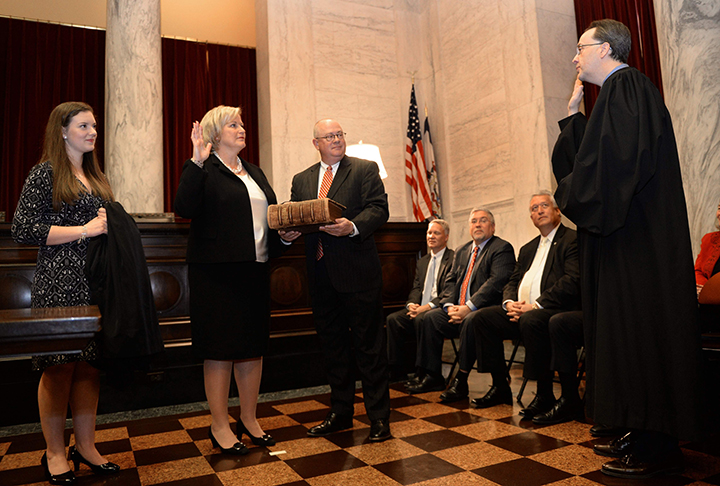By KATE WHITE
Charleston Gazette-Mail
CHARLESTON, W.Va. — The West Virginia Supreme Court will have a female majority for the first time when Beth Walker takes the bench next week.

(Photo by Kenny Kemp)
Walker will join Justices Margaret Workman and Robin Davis in making West Virginia one of 11 top courts that will have a majority of justices who are women in 2017.
“We’ve come a long way, baby,” Davis said earlier this month about the upcoming female majority.
On Dec. 16, Davis marked her 20-year anniversary as a Supreme Court justice. There have been seven other justices who have served on the court 20 years or more. All have been men.
Davis said that when she graduated from law school about 35 years ago, even female lawyers in West Virginia were few and far between.
Davis talked about some of her experiences as a female lawyer and Supreme Court justice with the girls who attend her son’s former boarding school. She said the female students were shocked after hearing about a time in 1984 when Davis appeared before a Kanawha County judge to represent a woman whose husband had filed for divorce once he became a doctor.
Davis argued during the hearing that her client should be reimbursed, as she had been the breadwinner throughout most of the relationship and financially supported her husband during his time in medical school. The theory she presented on reimbursement alimony was new at the time, Davis said.
“I made my argument and the circuit judge in Kanawha, I won’t tell you his name, I’ll never forget, he looked at me and then looked at my colleague, who was an older male.
“He said, ‘Isn’t she cute? That’s pretty creative, but it’s not going to fly in my courtroom,’ ” Davis said, recalling the hearing.
The judge’s ruling was overturned and Davis won the case on appeal.
Although Davis said some judges still weren’t used to having female lawyers appear before them in the early 1980s, in 1988 Workman became West Virginia’s first female Supreme Court justice and first woman to be elected to statewide office.
Before that, Workman was appointed to serve as a Kanawha circuit judge in 1981. She was the second female circuit judge in the state. She then was elected to fill an unexpired term in Kanawha, in 1982 and again in 1984.
Workman resigned from the high court in 1999, with 18 months left on her term. She said that had nothing to do with her experience on the court and being the only woman.
In fact, Workman said her colleagues on the bench at that time treated her as their equal — especially former justices Thomas Miller and Thomas McHugh, who served as her mentors.
Workman ran and was elected Supreme Court justice again in 2008.
Davis joined the high court in 1996. She said she was glad to have Workman with her there for her first few years on the bench.
Davis and Workman said their gender doesn’t influence the way they rule. But, they added, that all judges have a lifetime of experiences that can make them see things differently.
“People have different philosophies on life. I don’t think it has much to do with their gender,” Workman said.
During their terms on the high court, Davis and Workman, who both are mothers, have devoted time to working on issues that affect women and children.
Cases involving juveniles, for example, don’t matter any less to their male colleagues, though, they said.
As chief justice in 1993 and 1997, Workman fostered a close working relationship between the court system and domestic violence programs. She visited many shelters to learn how the court system could be more effective in addressing domestic violence.
Workman also created the Task Force on Gender Fairness in the Courts.
Davis is the Supreme Court’s designee to the judiciary’s initiative on truancy. She also has initiated a number of programs that have been essential to the court’s involvement with children and families, according to the court’s website.
While she doesn’t believe it will change the outcome of cases, Workman said more female judges are needed in West Virginia.
Out of the 74 circuit judges in the Mountain State, eight of them are women. That number went from five to eight in this year’s election.
“Women don’t run [for office] as much as men,” Workman said. “I’ve had law clerks, and I’ll tell them, ‘You should be a judge.’ They’ll say, ‘I’d love to, but I don’t want to go through the campaign.’ ”
There are more female lawyers now than ever before. According to the American Bar Association, for the first time this year, women outnumber men in law schools.
“There were only three or four out of the hundred when I was in law school,” Workman said.
Walker, a Morgantown lawyer, said last week that she admires Davis and Workman for paving the way for her election win.
Chief Justice Menis Ketchum and Justice Allen Loughry also make up the five-member court.
Walker defeated her four male opponents, including incumbent Justice Brent Benjamin, during the state’s first nonpartisan judicial election, in May. She also defeated former longtime state attorney general and justice Darrell McGraw, Beckley lawyer Bill Wooton and Clay County lawyer Wayne King.
Walker, whose term on the state’s highest court begins Jan. 1, was sworn into office on Dec. 5.
Other states with a female majority are Arkansas, California, Maryland, Massachusetts, Minnesota, New Mexico, New York, Tennessee, Washington and Wisconsin.
“Once I got in the [legal] profession, it was still pretty male dominated,” said Walker, who came to Charleston to work for the law firm Bowles Rice in 1990, after graduating from law school.
“There were a lot of women [at Bowles Rice] in leadership roles,” she said.
Walker said she hopes the female majority on the court will inspire young women.
“You can do anything you set out to do,” she said. “I’m really honored, there’s no doubt about it. I’ll be the 77th justice and only the third woman.”
See more from the Charleston Gazette-Mail





